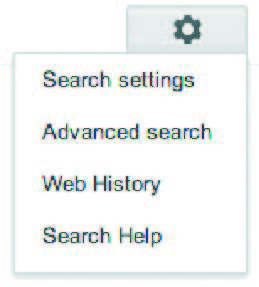It’s amazing what you can find on the internet, if you only know how to look for it, says Ollie Bray…
Even though being able to search the web these days might seem like such a basic and normal skill it is funny that there are still lots of people (both young people and adults) who do it really badly. Learning a few basic tips to improve your efficiency when searching the web will not only save you some time but will also help you discover powerful resources that can be used with your students.
Search by File Type

Through searching by ‘file type’ using the Google Advanced Search Menu (google.com) you can discover a whole heap of resources that have got instant practical application in the classroom and automatically filter out content that is likely to be less relevant. You can access the advanced search function by using the ‘cog’ menu on your search screen. For example, the search term below will just return PowerPoint files for Rainforests. This is a great way to get ideas or a starting point for your own multi media presentations.
Advanced image search

There are few things more frustrating than an image in a presentation that is pixilated. So when searching for pictures online first make sure that what you find is going to be of a high resolution and also make sure that as far as you know you have permission to use it. Google’s Advanced Image Search (google.com) is great tool for this. In Image Search mode you can open up the Advanced Search menu by using the settings ‘cog’ on the right hand side of the screen. From here you can specific all sorts of things about the image you want returned. For example, its size (the bigger the better for an on-screen presentation), its file type (.jpgs work well) and its usage rights (free to use or share – is good for school use).
Search videos by source and location

With all the on-line video that is now available online (on YouTube and other video sharing sites), gone are the days of having to set your VHS recorder to gather resources to show your students. The problem is there is so much video to choose from that it is difficult to find clips of the right length. Also YouTube is still blocked in some schools – however, there are other sites (like the BBC), which are normally accessible. Bing Video Search (bing.com) could be your answer here, as you can search by content, video length (eg: under 5 mins) and source.
Use Visual Search for project-based learning
Of course a web search is only as good as the terms that you put in. If you really want to get your students to understand and think about searching and search terms you might consider a visual search engine such as Quintura (quintura.com). Visual search allows you to see the other popular search terms associated with the term that you are searching for. For example, you search for ‘rainforests’ but because this is such a big topic you might actually mean ‘rainforest destruction’ or ‘rainforest destruction animals’. Visual Search is particularly useful for project-based work. 5Use a specialist search engine to find specialist things It sounds like comment sense doesn’t it? But people often forget that there are lots of specialist search engines for specific things. For example if you are working with A-level students on academic work try using Google Scholar (scholar.google.com), which searches scholarly literature and articles – or if you are working with Year 7 pupils you might consider using Kid Rex (kidrex.com), which is a more child friendly search engine. Similarly, if you want to search inside or find a book Google Book Search (google.com/books) is a good place to start. Finally, if you are looking for something completely different – check out Dog Pile (dogpile.com)!
NB If you enjoyed these tips, you should consider checking out Google’s Inside Search Cent
About the expert
OLLIE BRAY IS AN AWARD WINNING TEACHER, QUALIFIED HEAD TEACHER, CONSULTANT AND GOVERNMENT ADVISOR. HE IS CURRENTLY DEPUTY HEAD TEACHER AT GRANTOWN GRAMMAR SCHOOL IN THE CAIRNGORMS NATIONAL PARK AS WELL AS WORKING ON A NUMBER OF EXCITING INTERNATIONAL PROJECTS ACROSS THE UK AND EUROPE. FIND HIS BLOG AT OLLIEBRAY.COM, AND FOLLOW HIM ON TWITTER @OLLIEBRAY











It’s amazing what you can find on the internet, if you only know how to look for it